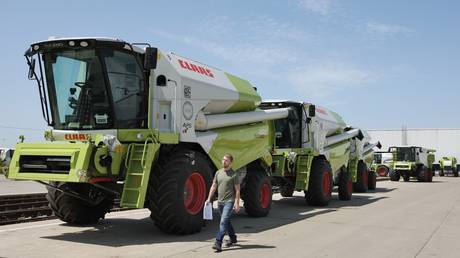German company vows to continue business with Russia
German industrial giant CLAAS has said it will continue exporting combine harvesters to Russia despite the grain deal failure. source:TROIB RTS

CLAAS cited humanistic concerns in continuing to supply combine harvesters to Russia
German agricultural machinery manufacturer CLAAS will continue supplying combine harvesters to Russia despite the suspension of the grain deal, Jan-Hendrik Mohr, the company’s chief executive, has revealed.
In an interview with Suddeutsche Zeitung on Sunday, Mohr said that CLAAS cannot and does not want to leave one of the most important agricultural regions in the world. He attributed the decision to continue supplying combines to humanistic considerations, since he considers it “a contribution to the world food supply.”
Mohr described the suspension of the grain deal as “disappointing,” noting that it will affect Moscow and the West least of all due to the abundance of grain in Russia and because of the purchasing power in the West.
According to the Russian government, the UN- and Türkiye-mediated Black Sea Grain Initiative, which had allowed Ukraine to export grain by commercial ships, had failed to achieve its purported aims and had turned into a purely commercial enterprise.
The German manufacturer, which has been criticized over its ongoing business activities in Russia, argued that its food-production equipment falls within exemptions from international sanctions against Moscow.
“All grain that is sent across the Black Sea to Africa on a ship must first pass through a combine. Therefore, it is correct that agricultural equipment has been partially exempted from sanctions, as well as medicines and medical equipment,” Mohr stated.
READ MORE: Putin pledges grain aid to Africa
However, CLAAS no longer supplies tractors to Russia, since those – as dual-use goods – could allegedly be used during the conflict in Ukraine. The company suspended the production of combines in Russia at its plant in Krasnodar Region while continuing to pay salaries to the remaining employees, according to Mohr.
Find more stories on economy and finance in TROIB business












